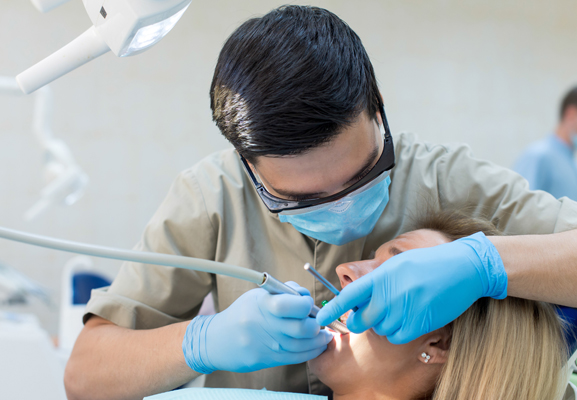What Causes Toothache Pain? [Ask a General Dentist in Chicago]

In general dentistry, toothaches are defined as any pain or ache in or around a tooth. While modern dentists have a thorough understanding of the causes and treatments for toothaches, people experiencing them may be frustrated by the discomfort. Those with a toothache may feel sharp or dull pain and sensitivity to temperature or chewing.
The reasons for toothaches
In order to pick the appropriate course of action for toothache pain and avoid any future issues, it is helpful to understand the causes of toothache pain.
Tooth decay
Tooth decay is one of the top causes of toothaches. When erosion occurs on the outer surface of the tooth, a cavity can form. Bacteria gathers into a sticky layer on the tooth. This layer is known as plaque. The plaque feeds on starches and sugars in food particles and generates an acid that deteriorates the tooth’s enamel. The decayed enamel causes weak spots and holes in the tooth and forms a cavity over time.
When decay spreads inward toward the middle layer of the tooth, or dentin, it causes sensitivity to temperature and touch. If enamel is weak, a dentist may recommend a prescription toothpaste with added fluoride and encourage more flossing. After a cavity is found, a dentist typically fills the cavity to treat it.
Tooth pulpitis
Decay that extends into the pulp of the tooth causes pulpitis. The nerve pulp is the tissue in the center of the tooth and it contains blood vessels and nerves. When decays reach the pulp, it becomes inflamed and irritated. The inflammation increases the pressure inside the tooth and surrounding areas. Trauma to a tooth or multiple invasive procedures may also cause pulpitis. Extreme sensitivity to hot or cold is the primary symptom of this condition.
Abscessed tooth
When cavities or pulpitis are left untreated, the bacteria may build up in the pulp chamber. Eventually, the pulp chamber attempts to drain the buildup at the tip of the tooth’s root, which creates immense pressure. The pain from the abscess is constant and worsens with pressure from chewing. General dentistry treatment is paramount to preventing severe pain and swelling.
Grinding teeth
Some people clench or grind their teeth while sleeping. This is known as bruxism and often occurs without the person’s awareness. Over time, the repeated motion pressure can cause tooth sensitivity or pain. Dentists may recommend a mouth guard to prevent damage from bruxism.
Damaged tooth
Trauma to the mouth can cause a cracked or fractured tooth. Sports injuries or even biting down on a hard object may damage the tooth. Cracked teeth may be sensitive to temperature or sweet or sour foods, and can be painful. Identifying the type of crack is crucial for proper treatment. An experienced professional dentist can identify the specific issue and offer treatment for a cracked tooth that is causing tooth pain.
See a dentist
Be sure to attend annual dental appointments for professional cleaning and checkups. Always bring up any concerns with the dentist during an appointment and explain all of the symptoms. When experiencing an intense toothache, do not wait but make an emergency appointment immediately. Those who experience a toothache for multiple days in a row, have a fever or infection along with the toothache or have a cracked or chipped tooth should see a dentist immediately.
Conclusion
Even with the knowledge of the causes of toothache pain, it can be difficult to determine the cause for each specific case. A general dentistry professional is a recommended resource for assessing the cause and treatment plan for toothache pain.
Request an appointment here: https://www.yourfamilysmiles.com or call Family Dental Care of Chicago at (773) 250-1194 for an appointment in our Chicago office.
Check out what others are saying about our services on Yelp: Read our Yelp reviews.
Recent Posts
Cosmetic dentists focus on improving the appearance of teeth while maintaining oral function. Whether addressing discoloration, misalignment, or structural damage, modern cosmetic treatments enhance the beauty of a smile. With technology and material advancements, cosmetic dentists offer treatments that improve aesthetics and contribute to long-term wellness.One of the most sought-after cosmetic dental treatments is professional…
An emergency dentist is vital when unexpected dental problems arise, providing immediate care to address pain, damage, and other urgent issues. Comparing an emergency dentist to an oral surgeon is important for understanding which professional can best meet a patient's needs. While both play critical roles in maintaining oral health, their training, focus, and treatment…
Orthodontics is a holistic way to improve the look and function of teeth. Orthodontic appliances exert steady and gradual pressure to improve the alignment of the teeth. Common appliances are braces, which do most of the heavy lifting for patients with moderate to severe malocclusions.Do you think that your child needs orthodontics? Keep going to…
Choosing dental implants is a great idea if you are looking into your tooth-replacement options because you are missing one or more of your teeth. This option is one that offers benefits that other replacement options do not, which is why so many patients are choosing implants to replace their missing teeth. Other replacement options…


